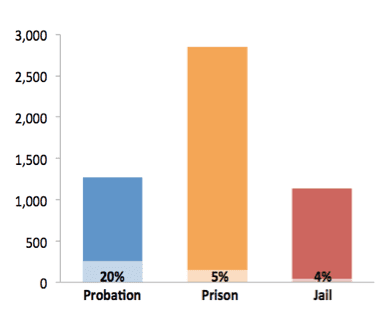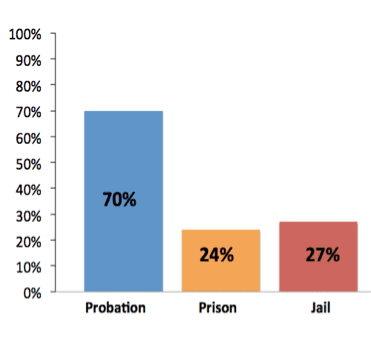In 2014, leaders in Nebraska asked The Council of State Governments (CSG) Justice Center to help the state tackle prison overcrowding using a justice reinvestment approach. Victim advocates in the state were actively engaged in the process, and the justice reinvestment legislation signed into law by Governor Pete Ricketts in May 2015 is projected to increase the amount of victim restitution collected by $2.8 million over the next five years.
Data collected by the CSG Justice Center during the justice reinvestment process revealed that courts were found to be far more likely to order restitution for sentences to probation than to jail or prison. In a survey of district court judges, respondents indicated that they rarely included restitution orders in sentences to prison because of statutory language requiring them to consider a defendant’s ability to pay at the time of sentencing. (See Figure 1) Further, people on probation in Nebraska were nearly three times more likely to pay some or all of the restitution they owed than people in jail or prison. (See Figure 2)
A review of the Nebraska Department of Correctional Services (DCS) policies and practices showed that DCS was authorized to withdraw money from incarcerated peoples’ accounts only if a restitution order specifically required that it be collected while someone was in prison. Also, judges did not consistently include specific language about payment during incarceration within restitution orders, so victims did not receive payments during time served.
Figure 1. Percent of Felony Sentences that Included a Restitution Order, FY2013
Figure 2. Percent of Felony Restitution Orders that Were Fully or Partially Paid, FY2013
In December 2014, Toni Jensen, a board member of the Nebraska Coalition for Victims of Crime (NCVC), testified before the justice reinvestment working group to support the proposed restitution sections of Legislative Bill 605. During the 2015 legislative session, board members of NCVC wrote an op-ed for Omaha.com’s Public Pulse stating their support to increase the amount of restitution collected in prison through mandatory deductions from deposits made to inmate trust accounts.
LB 605 was signed into law in May 2015 and is expected to ease overcrowding in prisons, avert $302 million in prison construction and operations costs, and reinvest in efforts to strengthen supervision and reduce recidivism. This justice reinvestment legislation also puts measures in place to improve how restitution is ordered and helps people meet the restitution terms of their sentence even while incarcerated.
As a result of the legislation, portions of deposits into an incarcerated person’s account are now routinely deducted to cover the restitution he or she may owe without specific language from a judge authorizing this withdrawal. Additionally, when mandating restitution, a judge may consider someone’s ability to repay over the course of his or her lifetime, rather than considering only the person’s income at the time of the crime. Improvements to the management of victim restitution are projected to generate a $2.8 million increase in restitution ordered for victims in the next five years. Jensen said, “LB 605 improves victim restitution policy, and as a result positively impacts Nebraska’s crime victims.”
More information about justice reinvestment in Nebraska is available on this page.
This project was supported by Grant No. 2013-ZB-BX-K002 awarded by the Bureau of Justice Assistance. The Bureau of Justice Assistance is a component of the Department of Justice’s Office of Justice Programs, which also includes the Bureau of Justice Statistics, the National Institute of Justice, the Office of Juvenile Justice and Delinquency Prevention, the Office for Victims of Crime, and the SMART Office. Points of view or opinions in this document are those of the author and do not necessarily represent the official position or policies of the U.S. Department of Justice.
Arkansas policymakers have long expressed concerns about the state’s high recidivism rate. Over the past 10 years, an…
Read MoreIn April 2025, Arkansas Governor Sarah Huckabee Sanders signed a package of bipartisan criminal justice legislation into law,…
Read More Explainer: Key Findings and Options from Arkansas’s Justice Reinvestment Initiative
Explainer: Key Findings and Options from Arkansas’s Justice Reinvestment Initiative
Arkansas policymakers have long expressed concerns about the state’s high recidivism rate.…
Read More Explainer: How a New Law in Arkansas Tackles Crime, Recidivism, and Community Supervision Challenges
Explainer: How a New Law in Arkansas Tackles Crime, Recidivism, and Community Supervision Challenges
In April 2025, Arkansas Governor Sarah Huckabee Sanders signed a package of…
Read More











